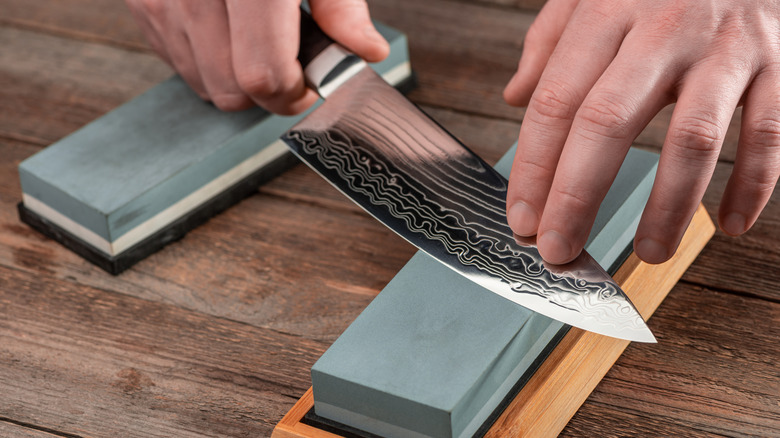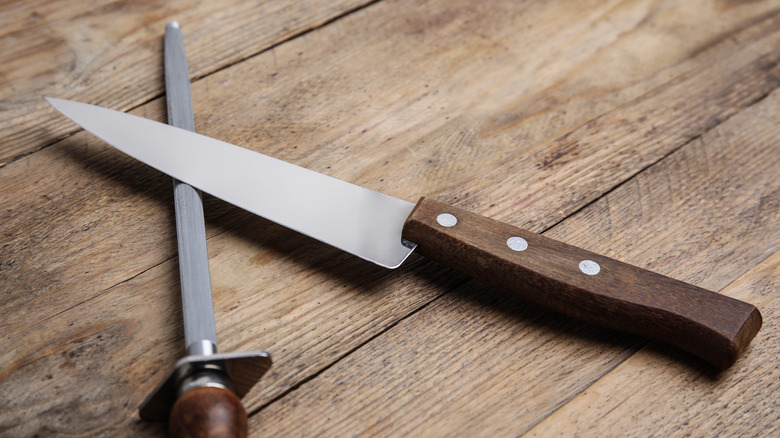How Often To Sharpen Your Knives According To A Chef
So you've recently invested in a set of the best knives out there, but inevitably, after a few days — or weeks — of flawless cutting, you're wondering about when you should sharpen them to keep up that smooth chopping.
Unfortunately, there's no simple, single answer, according to James Dumapit, executive chef at New York City omakase destination Bar Miller. "How often you should sharpen your knives has a lot to do with how you're using them and how sharp you want them to be," he explains in an interview with Chowhound. "There's nothing wrong with only sharpening your knives when you feel like they're getting a little dull, but there's also not a lot of harm in touching up a knife on a fine grit stone every couple of days."
And how should you sharpen them? Dumapit also has pointers. "The best method of sharpening in my opinion, and at any level, is on a whetstone," he says. "There's a learning curve, but there are plenty of resources and once you figure out how to do it, you become a much more capable cook with a deeper understanding of your tools."
Bear in mind that Dumapit's advice doesn't apply to serrated knives, like bread or steak knives. These can't be sharpened on whetstones or most knife-sharpening devices (regardless of whether they're manual or electric) — you need a sharpening steel or rod, but fortunately, they don't need to be sharpened nearly as often.
Okay, but roughly how often should I sharpen my knives?
So although the correct answer to "how often should I sharpen my knives?" is still "it depends on how often you use them," if you're a home cook, it's probably fine to sharpen your knives just two or three times annually. Some factors will affect how often you need to sharpen them. Obviously, if you're using them professionally or on a fairly heavy-duty basis (daily and for several hours at a time), you may want to sharpen them as often as once a month. Just pay attention to how well the knives are working: If they're cutting through all your ingredients like butter, there's no need to sharpen them, but if cutting requires more effort and you have to hack at your ingredients, it's time to get the whetstone out. Remember, that extra effort in chopping can result in more accidents in the kitchen, which is another good reason to sharpen them.
A couple of other factors to consider are what you're cutting, and the quality of your knives. The steel on cheaper knives tends to get dull faster compared to more upscale brands, so you'll want to sharpen them more often. If you're using them to cut tougher foods, like meat or maybe certain denser vegetables (say, pumpkins or squash), they may also need more regular sharpening.
Honing versus sharpening your knives
But wait, chef Dumapit mentioned "touching up a knife on a fine grit stone every couple of days" — which is a lot more often than a few times a year. That's because here, he's referring to the process of honing your knives, rather than giving them the full-scale sharpening treatment. The difference is that sharpening a knife basically gives the blade a whole new edge by effectively shaving off the blunted metal. Honing is more like routine maintenance or touching up the edge of the knife to make sure the blade is aligned, as it can bend out of shape while you chop.
Honing can be done with steel instead of a whetstone (which makes it a faster, less finicky process), although the stone is still an option if you're serious about your sharpness. There's no shortage of guides on how to hone a knife, but just know that it's a quick process that'll make for a seamless chopping session. You'll want to hone a knife much more often than you sharpen it; some sources suggest honing your knives after every use, but the average home cook can probably get away with doing it once a week.


